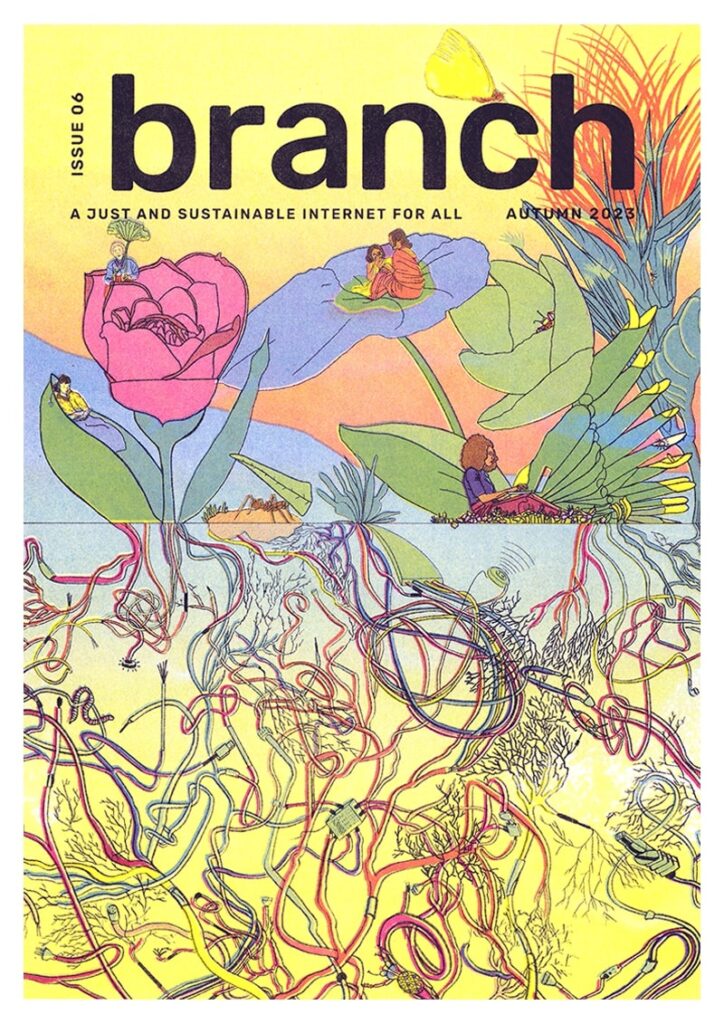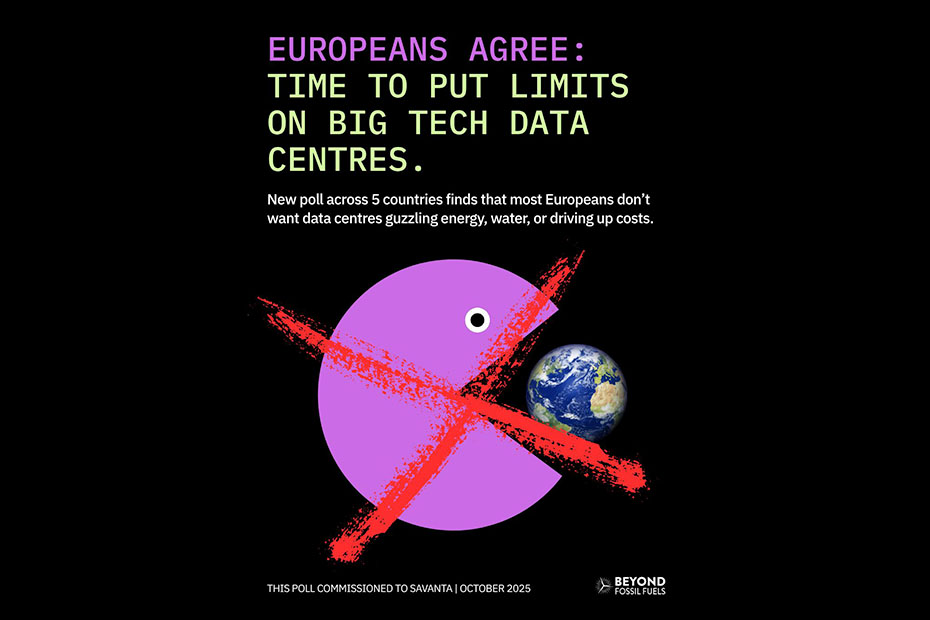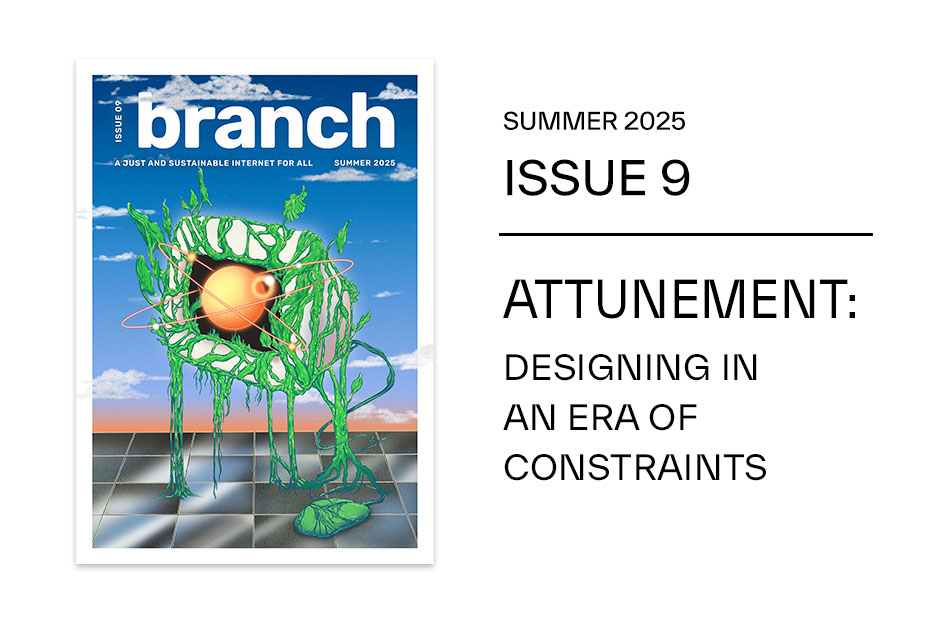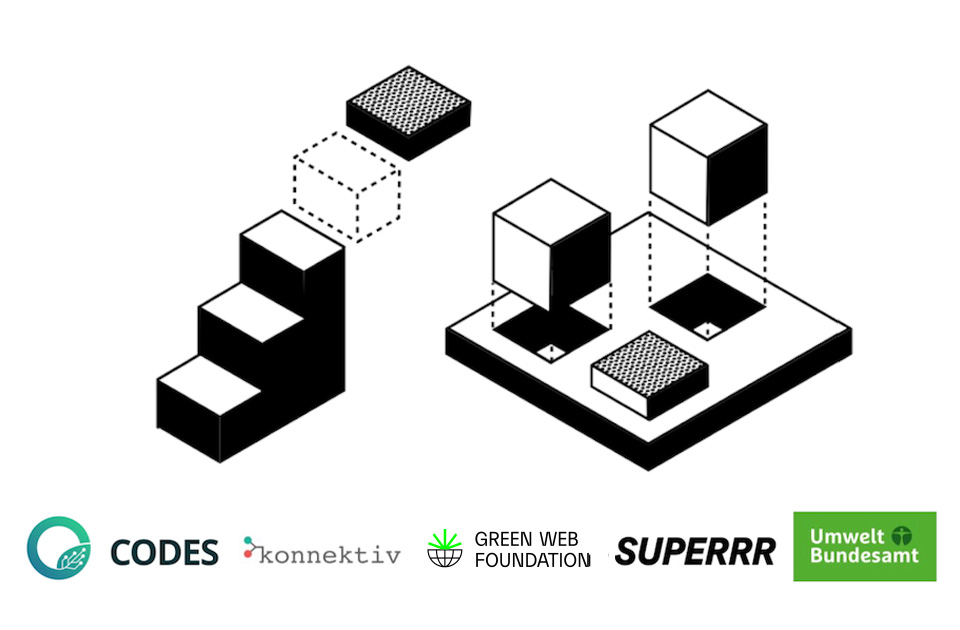A burgeoning community of grassroot and Indigenous organizers, digital rights and environmental NGOs, and philanthropic donors are on multiple, and at times converging, journeys to explore how digital rights and climate justice intersect.
Today we are proud to present ‘Branch Magazine: Issue #6 Green Screen’, that aims to amplify voices from feminist, decolonial and Indigenous perspectives, and which center care, respect, and non-extractive forms of exchange.

“The term ‘raw materials’ itself should be questioned, as it contributes to the neo-extractivism narrative by preparing the ground for the appropriation and transformation of relations, territories and memories into ‘natural resources’ or ‘materials’.”
Kuirme Collective
In this multilingual edition, edited by Katrin Fritsch, Maya Richman, Fieke Jansen and Katherine Waters, you will find different perspectives that critique technocapitalism, and envision pathways for just transition to sustainable and equitable infrastructures. It consists of four sections, each with a number of essay’s, interviews, and reflections.
Issue at a glance
Countering false and misleading solutions to ecological crisis
Becky Kazansky and Nikita Kekana [EN] reflect on and challenge the reduction of natural elements to financial commodities. In the interview about her book ‘Tecnologías para un planeta en llamas’ Paz Peña [ES] names and critiques technocapitalism and offers equitable feminist technological approaches as a way forward. We end this section with Jessica Botelho, Lori Regattieri, and Eliana Quiroz [EN] on empowering community-driven alliances against social-environmental and climate disinformation.
Towards a just and equitable transition
Heather Milton-Lightening [EN] speaks to the tensions and contestation between colonialism, capitalism, and justice, and discusses ways of organizing through which we can create the world that we want to see. A conversation between Joana Varon and Alana Manchineri [EN|PT] brings to light Indigenous struggle in the Amazon, the physical and technical colonial relations enforced on them, and ways of organizing. The Kuirme Collective [EN], consisting of Aymara Llanque, Camila Nobrega, and Rub(én) Solís Mecalco, invert the dominant discourse on extraction and identify ways to build alliances across movements and issues. Michael Brennan and Hanan Elmasu [EN] end with a reflection on navigating the interstices as funders.
Imagining sustainable and equitable infrastructures
Paola Mosso and Janna Frenzel [EN] reflect on their workshop discussion envisioning digital infrastructures and share time capsules from the future. They emphasize that digital infrastructures are not just machines or processes, but the people who design, maintain and inhabit them. Juliana Guerra [ES] narrows in on who governs our internet infrastructures, who gets to decide how sustainability is defined, and who benefits from it. Jennifer Kamau [EN] shows us that as long as migrants from climate-vulnerable countries are trapped in racialized infrastructures and do not have an equal seat at the table, there can be neither equity nor sustainability. Remy Hellstern and Jen Liu [EN] argue that we need to learn from nature and create proactive response frameworks and technologies that are regenerative by design.
“Border walls will not stop the climate crisis; they just reinforce the injustice of carbon capitalism.”
Jennifer Kamau
Building bridges and ensuring tech serves equitable climate action
The video message ‘An open movement to support climate action’ [EN] reinforces that open is a tool to shift power, that the open community is working to be in service of climate justice and equitable climate action. Luis Carrasco [ES] argues for the power of open data, but only if we can unlock its knowledge to the public. Maya Richman and Fieke Jansen [EN] reflect on their work to bring the climate justice and digital rights communities together and Nathaly Espitia [ES] offers an example of community organizing that centers self-care and collective care through ‘Postales sonoras’ or ‘Sound postcards’. Oona Castro [PT] investigates the need for just socio-environmental infrastructures in the Amazonian Region. We close this special edition with an interview with Molly Mathews [EN] on organizing behind the scenes.
Please read the contributions with care and appreciation for all those who are exploring this emerging intersection. Special thanks to Maya Adams and Kira Simon-Kennedy for the beautiful visuals and photographs that accompany the pieces; and to La Bruja RISO for the cover design.
About Branch Magazine
Branch is an online magazine written by and for people who dream of a sustainable and just internet for all. Creating change requires all kinds of practices—art and design, professional development, civic participation, policy and advocacy, imagination and positive visions for our future. This is why Branch is a space for personal reflection, critical engagement with technology and internet economics, as well as experimentation and storytelling. It is published by the Green Web Foundation.
About the Green Screen Coalition
The Green Screen Climate Justice and Digital Rights Coalition is a group of funders and practitioners looking to build bridges across the digital rights and climate justice movements. The aim of the coalition is to be a catalyst in making visible the climate implications of technology by supporting emerging on-the-ground work, building networks, and embedding the issue as an area within philanthropy. Beginning earnestly in spring 2021, the coalition consists of Ariadne, Ford Foundation, Internet Society Foundation, Mozilla Foundation, Green Web Foundation, critical infrastructure lab, and Stiftung Mercator.
If you are interested in staying up to date about the Green Screen and work on the nexus of climate justice and digital rights, we run a low volume mailing list over which we share a monthly newsletter. To receive it join this low volume mailing list.


